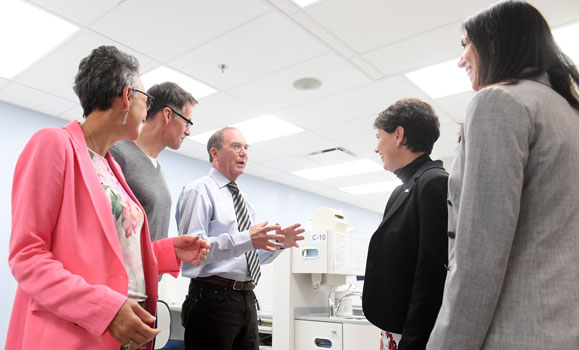The Faculty of Dentistry’s Immigrant Oral Health Outreach Clinic received $250,000 from Green Shield Canada (GSC) this week to expand its range of oral health care services and increase the number of clinics it holds.
Theresa Rose, the company’s senior account executive for Atlantic Canada, visited the Faculty Monday to present the cheque, made possible through GSC’s 2017 Community Giving Program grant.
“Removing barriers to oral health care for the whole population is one of our priorities at GSC,” says Rose. “This is an incredible program, one that has the potential to inspire students to become involved in humanitarian aid out in the world. I feel very privileged to be here.”
Ben Davis, acting dean of Dentistry, described the GSC gift as a “game changer” for the Faculty, enabling it to provide immigrants and refugees with “more access and more comprehensive care.”
“We are delighted to partner with GSC,” says Dr. Davis. “Our plan has always been, and continues to be, to help as many underserved populations as we can. This grant will enable us to expand our outreach activities and to give our students another opportunity to learn about the value of serving the wider needs of their communities.”
Emma Barr, GSC community investment manager, says the Community Giving Program working group was looking for organizations that showed innovative and thoughtful action to addressing the under-recognized and under-funded issue of oral health, in addition to helping new immigrants find their way in a new health care system.
“The HÂţ» Faculty of Dentistry Immigrant Oral Health Outreach Clinic addressed these two pressing issues: oral health and new immigrant health care navigation,” says Barr.
A population with higher rates of oral disease
The immigrant and refugee population of Nova Scotia has much higher rates of oral disease than the Canadian average. Fifty-three per cent of recent immigrants to the province, and 85 per cent of a Nepali refugee group, had untreated decay, compared to 20 per cent of Canadian adults. Both cost and language are barriers to gaining access to oral care.
At each Immigrant Oral Health Outreach Clinic, held in the Faculty’s on-site clinic, second-year dental hygiene students currently provide free preventative care to approximately 20 immigrants and refugees, whose visits are arranged by the Immigrant Services Association of Nova Scotia (ISANS). Dentistry students and students from other health professions volunteer their services as interpreters, helping to fill in patient medical histories and translating for both the hygiene students and patients during treatments.
While this basic cleaning care is important, up until now the clinic has been unable to provide much-needed restorative care and dental extractions. And the need is growing. In previous years, ISANS had approximately 180-200 new clients arrive from a variety of countries. But in 2016, 1500 new clients arrived, primarily Syrian refugees. Â
“Our hygiene students have provided as much preventative treatment as they could in the time available,” says dental hygiene professor Heather Doucette, who began the initiative and coordinates the clinics. “But we haven’t been able to provide treatments beyond hygiene or bring back patients for re-evaluation, which is an important step for both students and patients. The Green Shield Canada grant will enable us to extend the level of care the clinic offers and provide greater continuity of care. We will now be able to provide much needed restorative care and dental extractions."

(L to R): Dentistry's Debora Matthews (assistant dean of academics), Ben Davis (acting dean), Blaine Cleghorn (professor and assistant dean, clinics & building services), Green Shield's Theresa Rose, and dental hygiene professor Heather Doucette.
The impact of the grant will start to be seen on September 25, when dental students join their hygiene counterparts in the clinic and begin providing restorative care in addition to the cleaning and preventative care the hygiene students have offered for the past five years.
Navigating the system
The grant has also enabled the Faculty to hire an Arabic-speaking “navigator,” who communicates regularly with ISANS and co-ordinates scheduling, transport, interpreters, the collection of health histories and consents, and helps patients to find a permanent dental home. The number of clinics will increase from two to three a month.
The role of the navigator is a key component for GSC in the delivery of its Frontline Care granting program. “A navigator is essential to help guide patients and clients through the complex health care and social services system,” explains Barr. “In our Frontline Care grantee programs, navigators are found in a variety of roles – social workers, nurse practitioners, volunteers, case workers – and they are integral to treating the whole person.”
For Doucette, the grant will also act as a catalyst for forging links with other health professions within the university and the wider Halifax community.
“We work with students to instil in them the need to give back to their community,” she says. “The grant will enable us to use our model to involve different professions and create greater awareness so that we can try to meet this growing need.”

